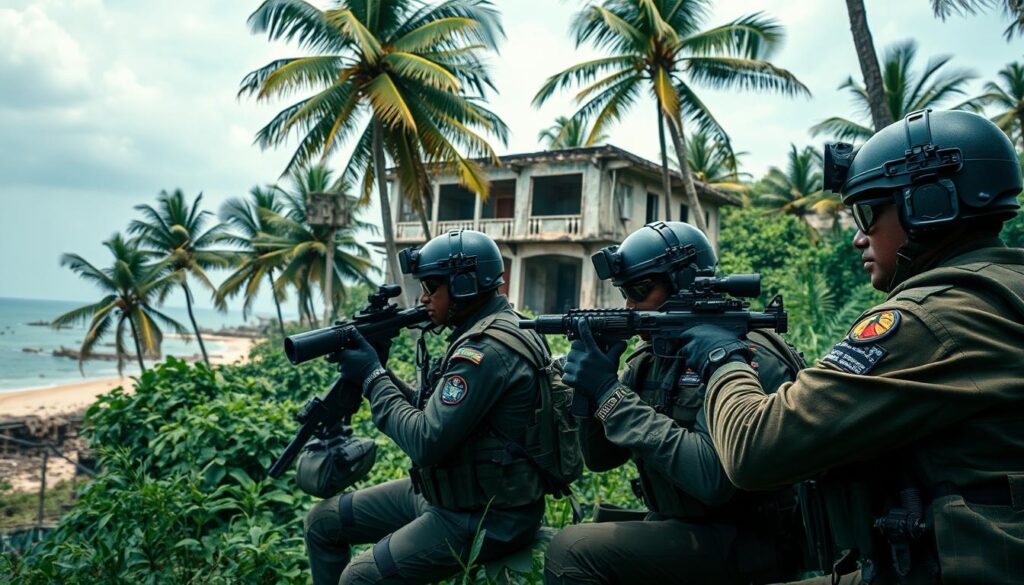Sri Lanka Offers Visa-Free Entry to Boost Tourism
To boost Sri Lanka Tourism, the country now allows visa-free entry. This is for people from 35 countries starting October 1, 2024. This six-month trial lets visitors stay for 30 days. It aims to increase tourism and grow the economy.
Sri Lanka has stopped online visa applications. But, you can still get Visa-Free Entry through embassies or when you arrive. Countries like India, the UK, and China are key in increasing tourists. KPMG in Sri Lanka is helping guide travelers during this time.
Tourists from Afghanistan, Syria, and North Korea can’t get visa on arrival. But many others can. This includes people from India, the UK, the US, and more. It makes visiting easier for many around the world.
This policy means visitors can explore Sri Lanka for up to six months. It’s designed to make traveling here simpler. And, it helps grow the tourism industry.

The Strategic Move to Invigorate Sri Lanka Tourism
Sri Lanka is making a big change to boost its economy through tourism. It’s starting a visa-free entry program to make travel to Sri Lanka more attractive. This bold move could change the game for Sri Lanka’s tourism sector.

Understanding the Visa-Free Entry Initiative
Sri Lanka is allowing travelers from 35 countries to visit without a visa. This aligns with trends that have helped other places increase their number of visitors. Travelers can stay for 30 days and possibly extend their visit. This makes traveling easier and puts Sri Lanka on the map as a great place to visit.
Anticipated Impact on Tourism Growth
Everyone is excited about the visa-free plan, expecting more tourists, similar to after 2019. Sri Lanka wants to use this to fill hotels to 85% during busy times, say industry experts. Also, easing visa rules has helped other tourist spots grow economically, as studies show.
Source Countries for Visa-Free Travelers
The 35 countries chosen include big tourism sources like China, India, Russia, the UK, and Germany. This strategy aims to attract lots of tourists and boost the economy. It also hopes to encourage more regional travel, which could bring in more revenue.
| Country | Expected Tourist Arrivals | Impact on Airfares |
|---|---|---|
| India | 300,000+ | -20% |
| China | 70,000+ | -15% |
| United Kingdom | 130,000+ | -10% |
Sri Lanka is focusing on key markets and global trends to boost tourism. By doing this, it’s showing how emerging destinations can grow.
Visa-Free Entry Amid Economic Recovery Efforts
Sri Lanka is making travel easier to boost tourism and economic recovery. This visa-free entry is a key part of their plan. It follows a global trend where easing travel rules helps the economy grow by attracting more tourists.
The Role of Visa-Free Access in Post-Pandemic Revival
Visa-Free Entry into Sri Lanka is a smart economic move. It helps the tourism sector bounce back, boosting the overall economy. By looking at other nations, Sri Lanka aims to become a top travel spot again.
Comparative Analysis of Similar Successful Policies
Looking at Thailand and Malaysia, we see how visa-free policies increased tourists. These countries had more visitors and economic growth. Sri Lanka expects similar success, improving its tourism and economy.
Infrastructure and Investment in Tourism
To make the most of visa-free entry, Sri Lanka is investing in tourism. They’re expanding resorts and bettering transport, especially along the southern coast. This will help manage more tourists.
| Year | Tourist Arrivals | Revenue Generated |
|---|---|---|
| 2023 | 1,487,303 | $1.5 billion (H1) |
| 2024 (Projected) | 2.3 million | $4 billion |
These figures show how important visa-free entry is for Sri Lanka’s economy. Easier access helps Sri Lanka meet tourism and economic goals.
Conclusion
In sum, Sri Lanka Offers Visa-Free Entry as a new plan. This action not only makes travel easier but also shows steps to boost tourism. Starting October 1, 2024, this trial policy will allow easy access for people from 35 countries. This includes big economies like India, China, and the United States. It also covers key tourist sources like the United Kingdom, Russia, and Germany. This decision comes after halting a costly e-visa system managed by an outside company. Now, a government-run online visa system is back, without the $25 charge.
A past try in 2023 to allow easier access without a visa was revealing, despite some issues with a foreign group’s contract. This move aims to rekindle its tourism sector, hit hard by the pandemic. Visa-Free Entry Sri Lanka plans to welcome a wider mix of global tourists. It also cuts down on the high fees for visas on arrival. This makes the travel sector more dynamic and provides a smooth welcome. For those outside the 35 countries, the on-arrival visa is still an option. This keeps Sri Lanka inviting and open to everyone worldwide.
Yet, the success of these efforts and their boost to the economy will hinge on strong promotion and steady government backing for tourism. As Sri Lanka starts this hopeful adventure, watching and adjusting the policies will be key. This ensures they truly help in broadening the economic growth by reviving a crucial industry.




